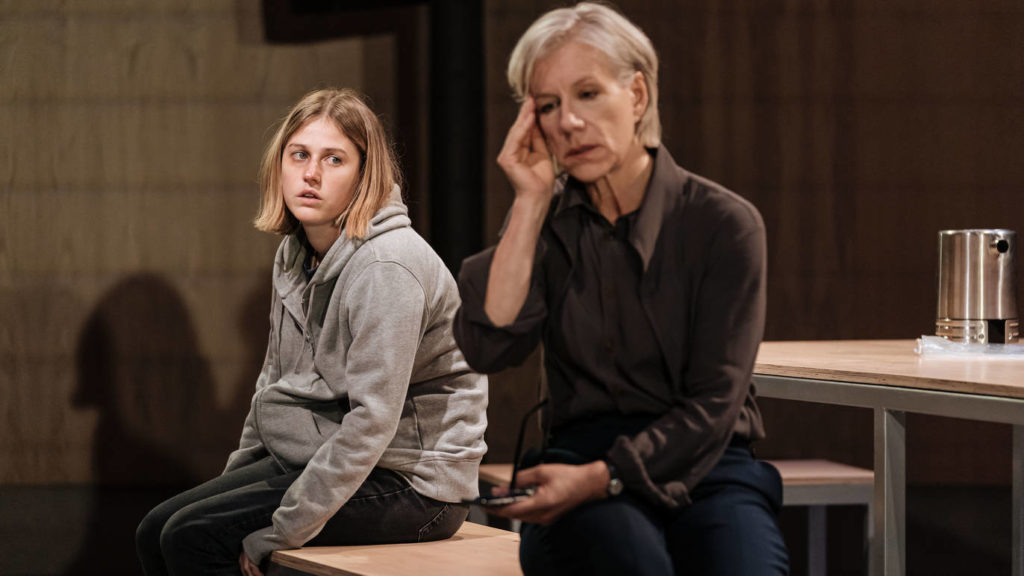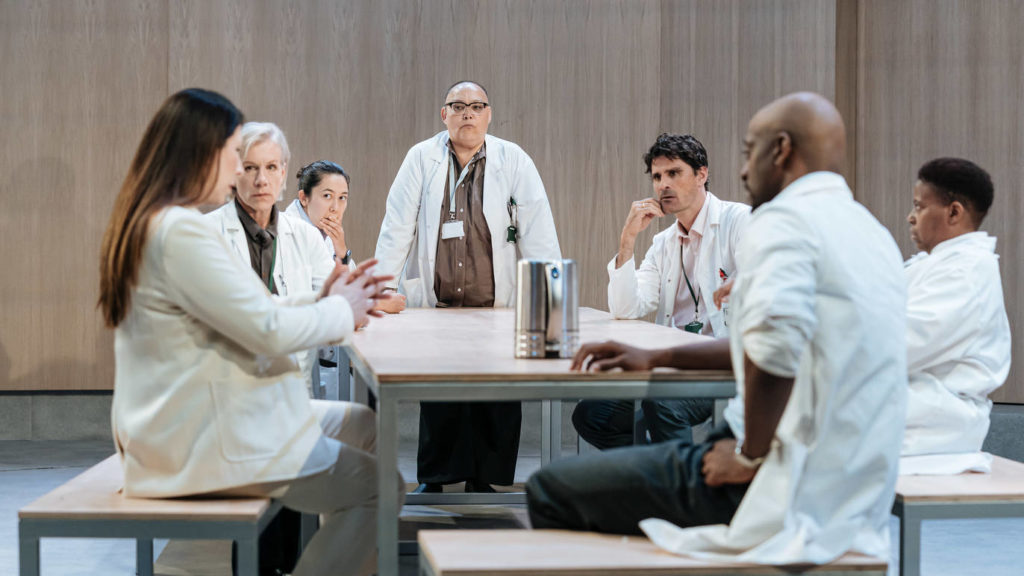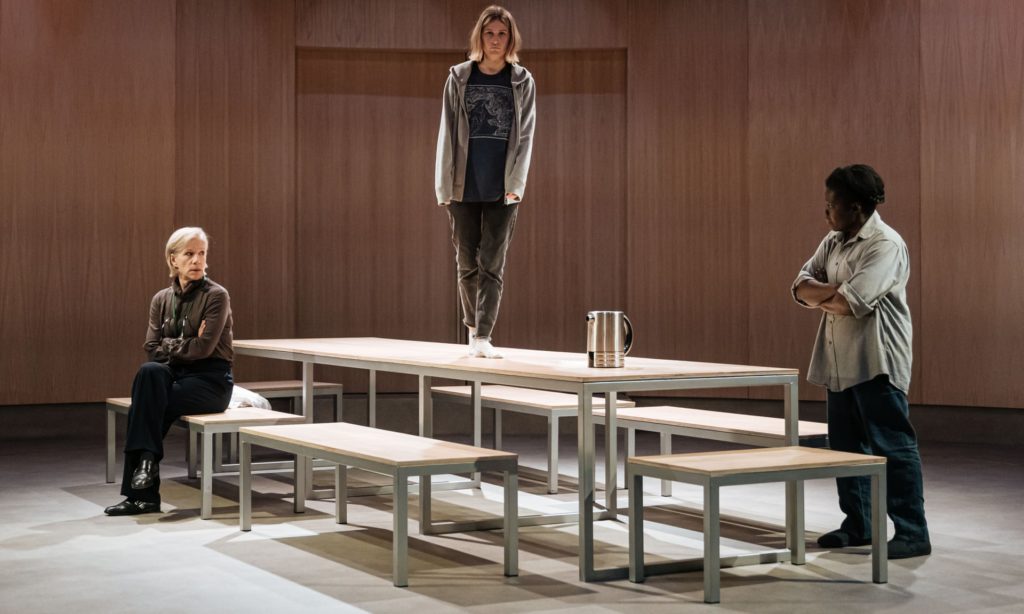
Is a home without a kettle even a home? ‘Oh David, such a homemaker,’ sighed a visitor to my spartan university room, softened only by a kettle and the complete Arden Shakespeare. But the kettle was hospitality and self-care for a scaredy-cat student; even today it amplifies (and, on grouchy days, paves the way back towards) connection. A kettle is the first step towards home.
In The Doctor – Robert Icke’s coruscating new play based on Schnitzler’s Professor Bernhadi – the kettle is pretty much the only step. It’s one of very few props in Hildegard Bechtler’s exposing design. At the hospital where Professor Ruth Wolff is director, there are case notes and lanyards. At home, there’s only the kettle. It’s in view for most of the play. Only Juliet Stevenson’s transfixing Wolff gets more stage time – this character of remorseless commitment almost never leaves our sight, not even for the interval.
Kettles may be kitchen keystones but are also often its least elegant object. Squat old whistlers, off-white plastic jugs, hi-tech braggarts. They don’t have to be lookers to be lowkey beloved. Wolff’s kettle is a shiny steel upright, round-based and with a truncated stump of a spout. It has a dalek vibe, which figures. Wolff is controlled, unyielding, out of step socially yet state of the art in her work – a dalek kettle is probably how she appears to her colleagues.

The kettle stays put for the hospital scenes – after all, a workplace without a kettle is almost unheard of. It’s the anchor of bonding and shunning, of acts of kindness and microaggression. No one actually uses it during The Doctor’s bruising, fraught meetings – though if they did, you can bet it would be the conduit for pass-agg beveraging, with tea-making duties foisted on the most junior member of the medical team (a permanently disgruntled Kirsty Rider). Maybe if everyone stopped grandstanding and shared a cuppa they could avoid the sexism and anti-semitism, the conniving and betrayal that lead to Wolff’s downfall.
Although her trajectory mirrors that of Schnitzler’s protagonist from 1912 – another Jewish doctor who finds that anti-semitism is alive and snarling – Wolff falls foul of a very contemporary culture war. When she refuses a Catholic priest permission to visit a dying patient (victim of a self-administered termination), he films and shares the encounter. One online petition later, Wolff has become a pariah – shamed as godless, racist or Jewish depending on who does the shaming.
Icke’s play (which he directs, unsparingly, to the queasy beat of Hannah Ledwidge’s percussion) comes at a precisely fraught cultural moment. Many of us feel caught between the identities the world sees in us and those we see in ourselves. Icke’s production casts across gender and ethnicity, as productions increasingly do – but doesn’t signal the casting until quite far into the play. A doctor’s white coat covers all identities, so we’re jolted when a female actor (Naomi Wirthner) is revealed as Wolff’s bullish male antagonist, a black actor (Oliver Alvin-Wilson) announces himself as Jewish, or a white actor (Paul Higgins) as the black priest. By the time we learn their ‘official’ identities, we’ve already accumulated assumptions based on what we’ve seen. It’s wrongfooting (even if Icke can’t control audience titters at each reversal, and which make the choices seem trivial). Brilliantly, we never know if Charley, Wolff’s partner, played by Joy Richardson, is male or female – which in turns lets Wolff retain the privacy of her private life.
As the casting makes clear, the blessed state of being identity-free is a lost luxury, an indulgence for our private moments. Wolff – a pioneering female researcher, a wholly secular Jew – doesn’t especially consider herself either Jewish or a woman in her working context, but especially when embroiled in controversy, she doesn’t have the luxury of label-free living. Other people assess her identity, judge her through its lens. As Thomas Ostermeier (whose production of the Schnitzler play is in rep at the Schaubühne in Berlin) defines the central question, ‘I put it in one sentence: how can you be a humanistic person and not a political one in political times?’

Stevenson herself is cast against type. Her soft-brushed patrician tones might not be everybody’s first pick for a Jewish heroine, and the role denies the actor’s impulsive, destabalising warmth. She has to stay chilly, intellectually ‘crystal clear’ even if politically bamboozled, her muscles held in a ramrod state of tension. In one late, brief sequence she hurtles around the stage and the furiously unleashed movement comes as momentary relief, a hot breath on a chilly day.
Does Wolff ever feel at home? Possibly not, or not often. We know that she lost at least one grandparent to the holocaust; maybe her family came over in the 1930s rather than the turn of the century, so it would hardly be surprising if her parents shared the packed-suitcase syndrome of so many Jewish families. The kettle, Wolff tells us, was a constant in her upbringing – ‘maybe a biscuit if you’d been good’ – and tended as an icon of the home. As long as the kettle was warm, you were safe. She keeps it on the boil even now, whether or not she fancies a tea.
Late in the play, Wolff recounts a moment when she realised the kettle had gone cold, an immediate intimation of disaster. It’s devastating. It’s perhaps not surprising that, over the past year or two, I’ve written fairly frequently about props that carry ideas of home – whether these ideas settle around food, furnishings or duck-based décor. Home feels far less stable an idea that once it did, and anxieties around migration and nation put acute pressure on the domestic. A cold wind blows; our nests shake.
All photos by Manuel Harlan
Follow David on Twitter: @mrdavidjays

Leave a Reply